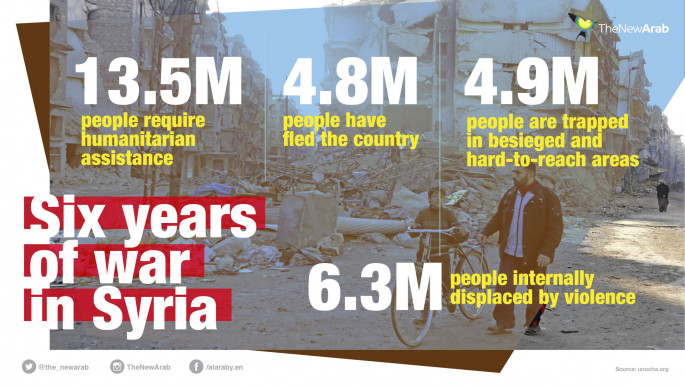Syrian hospital saves lives by going solar
Neo-natal wards and emergency rooms in a northern Syrian hospital now have uninterrupted electricity for the first time in years thanks to new solar panels, a charity said.
Hospitals in rebel-controlled Syrian territory face life-threatening power outages due to airstrikes or shortages of the precious fuel used for their generators.
The Union of Medical Care and Relief Organisations (UOSSM) hopes their new solar project, which launched on Tuesday, can circumvent both challenges.
The UOSSM has installed 480 solar panels at a large hospital in opposition-controlled territory in northern Syria since December, it said, and the project officially went online on Tuesday.
The medical charity declined to specify the hospital's location out of fear it would be targeted by bombardment.
"Our goal was to install a solar energy system that can provide clean, reliable and low-cost energy to Syrian emergency hospitals," said Tarek Makdissi, who directs UOSSM's Syria Solar project.
"Patients in this hospital should never be hurt again because of a power cut," said Makdissi.
The World Health Organization has called Syria the world's most dangerous place for health workers, and hundreds of medical facilities have been destroyed in the six-year war.
Some of the most infamous attacks on medical infrastructure took place as government forces tried to retake second city Aleppo from rebels last year.
 |
Patients in this hospital should never be hurt again because of a power cut |  |
'Living under bombardment'
One attack there in August left four newborn babies dead after the force of the blast cut off the oxygen supply to their incubators.
Last month alone, medics said airstrikes knocked seven hospitals and clinics out of service in the northwestern province of Idlib.
According to UOSSM, the panels will help their facility save more than 7,000 litres (1,850 gallons) of expensive diesel each month - amounting to an average of 20-30 percent of its energy costs.
They will help power care for between 700 and 800 patients.
And in case the power cuts completely, wards like the neo-natal facility, intensive care units, and emergency rooms can still run independently, said Shadi Alshhadeh, head of UOSSM's Switzerland branch.
 |
Our goal was to install a solar energy system that can provide clean, reliable and low-cost energy to Syrian emergency hospitals - Tarek Makdissi |
 |
The hospital's medical staff first thought of installing solar panels in 2014.
"When I first heard the idea, I thought these guys were crazy - they're living under bombardment and thinking about clean, alternative energy?" Alshhadeh told AFP.
"But in reality, this isn't just about energy or the environment. This will allow all critical departments to keep working if there's bombing near the hospitals or if the power cuts," he said.
UOSSM will now seek about $1.5 million to fund solar panels at five more hospitals in rebel-held areas of northern Syria.
The conflict in Syria erupted in March 2011 with widespread anti-government protests, but it has since evolved into a multi-front civil war.
More than 320,000 people have been killed and millions displaced by the violence.
 |
![Syria hospital [AFP] Syria hospital [AFP]](/sites/default/files/styles/image_345x195/public/media/images/6145BFEE-63D1-4357-AED3-2D51230E9A58.jpg?h=d1cb525d&itok=IXYAS5qE)




 Follow the Middle East's top stories in English at The New Arab on Google News
Follow the Middle East's top stories in English at The New Arab on Google News


